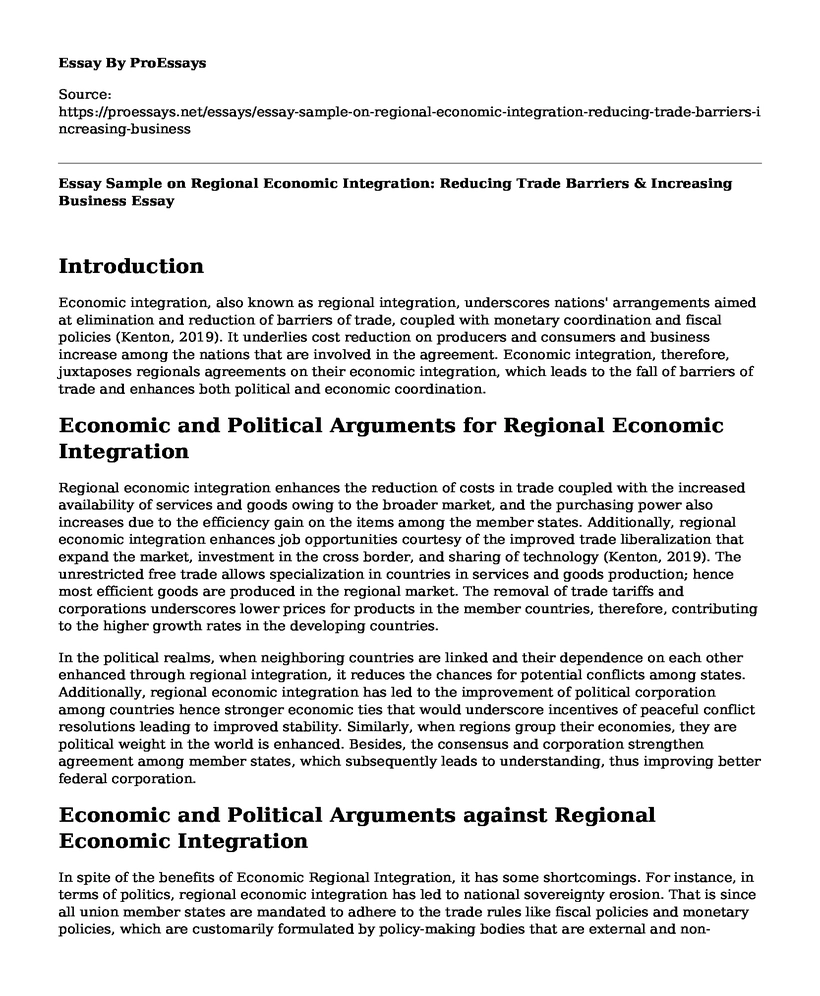Introduction
Economic integration, also known as regional integration, underscores nations' arrangements aimed at elimination and reduction of barriers of trade, coupled with monetary coordination and fiscal policies (Kenton, 2019). It underlies cost reduction on producers and consumers and business increase among the nations that are involved in the agreement. Economic integration, therefore, juxtaposes regionals agreements on their economic integration, which leads to the fall of barriers of trade and enhances both political and economic coordination.
Economic and Political Arguments for Regional Economic Integration
Regional economic integration enhances the reduction of costs in trade coupled with the increased availability of services and goods owing to the broader market, and the purchasing power also increases due to the efficiency gain on the items among the member states. Additionally, regional economic integration enhances job opportunities courtesy of the improved trade liberalization that expand the market, investment in the cross border, and sharing of technology (Kenton, 2019). The unrestricted free trade allows specialization in countries in services and goods production; hence most efficient goods are produced in the regional market. The removal of trade tariffs and corporations underscores lower prices for products in the member countries, therefore, contributing to the higher growth rates in the developing countries.
In the political realms, when neighboring countries are linked and their dependence on each other enhanced through regional integration, it reduces the chances for potential conflicts among states. Additionally, regional economic integration has led to the improvement of political corporation among countries hence stronger economic ties that would underscore incentives of peaceful conflict resolutions leading to improved stability. Similarly, when regions group their economies, they are political weight in the world is enhanced. Besides, the consensus and corporation strengthen agreement among member states, which subsequently leads to understanding, thus improving better federal corporation.
Economic and Political Arguments against Regional Economic Integration
In spite of the benefits of Economic Regional Integration, it has some shortcomings. For instance, in terms of politics, regional economic integration has led to national sovereignty erosion. That is since all union member states are mandated to adhere to the trade rules like fiscal policies and monetary policies, which are customarily formulated by policy-making bodies that are external and non-elected. Most member countries may be forced to give up their political rights, coupled with the failed determination of their domestic economic policies (Juma & Mengani, 2018). That makes many counties in the region to lose at the expense of other countries owing to the painful adjustments and more significant sacrifices entailed before being members of integration like giving up their monetary and fiscal policies like trade policies and tax policies.
Economically, since regional economic integration enhances trade diversions, it can make a trade to be diverted from nonmembers to members, albeit the economic detrimentally for the member states. Similarly, regional economic integration may lead to employment reductions and shifts since some developed countries may take advantage of it. They can do that by moving productions to cheaper labor markets in the member states as some workers move to other regions in the quests for better salaries and employment. The instant employment shifts may increase the taxation of resources in the member states.
Conclusion
Regional economic integration has enabled countries to focus on development and enhance trade among neighboring countries through the removal of trade barriers, the creation of a stock market, and free determination of independent trade policies. That has subsequently increased business, employment opportunities, and political corporation and consensus. However, economic integration also has its demerits like national diversion of trade, reductions of employment, and sovereignty loss, which has made most member states give up their political and economic rights.
References
Juma, C., & Mengani, F. (2018).African Regional Economic Development. Harvard School,Belfer Center for Science and International Affairs. Retrieved fromhttps://www.belfercenter.org/publication/african-regional-economic-integration
Kenton. (2019, August).Economic Integration. Investopedia. Retrieved fromhttps://www.investopedia.com/terms/e/economic-integration.asp
Cite this page
Essay Sample on Regional Economic Integration: Reducing Trade Barriers & Increasing Business. (2023, Mar 27). Retrieved from https://proessays.net/essays/essay-sample-on-regional-economic-integration-reducing-trade-barriers-increasing-business
If you are the original author of this essay and no longer wish to have it published on the ProEssays website, please click below to request its removal:
- Indian Rupee Essay
- Introduction to Macroeconomics
- Physician-Health System in Rural Canada Paper Example
- Essay Sample on Fair Treatment of Ethnicities
- Paper Example on Variable Cost and Fixed Cost: Explained
- Essay Sample on Switzerland: Rapid Economic Growth and High GDP Per Capita
- Paper on Healthcare Staffing: Optimizing Patient Ratios for Better Outcomes







